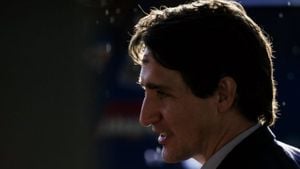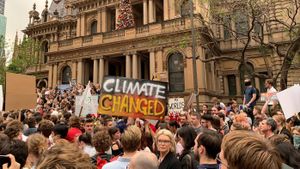President-elect Donald Trump recently announced the creation of a new initiative dubbed the Department of Government Efficiency, or DOGE, aimed at drastically reducing federal spending and cutting down on bureaucratic waste. Leading this ambitious project will be none other than tech mogul Elon Musk and entrepreneur Vivek Ramaswamy, both of whom have been significant supporters of Trump’s administration.
The appointment pushes forward Trump’s vision of streamlining government operations during what he calls the "Save America" Movement. Responding to concerns about the staggering federal budget—which tops $7 trillion with nearly $2 trillion of deficit against approximately $5 trillion of revenue—Trump claims there are significant inefficiencies within the government. He stated, "Together, these two wonderful Americans [Musk and Ramaswamy] will pave the way for my Administration to dismantle Government Bureaucracy, slash excess regulations, cut wasteful expenditures, and restructure Federal Agencies."
Musk, more famously known as the CEO of Tesla and SpaceX, and Ramaswamy have vowed to adopt what they describe as "an entrepreneurial approach" to government reform. Trump’s statement specified the aim is to create “a smaller Government, with more efficiency and less bureaucracy,” which is considered as one of the gifts he hopes to deliver to the American people by July 4, 2026—just in time for the 250th anniversary of the Declaration of Independence.
The duo’s strategy appears to center around significant cuts to both the federal workforce and spending. Musk and Ramaswamy intend to rely on recent Supreme Court rulings to challenge the authority of federal regulatory agencies, with claims they wish to "liberate individuals and businesses from illicit regulations never passed by Congress."
The crux of the initiative posits the requirement of reviewing existing regulations and assessing the operational efficiency of federal government sectors. They propose to explore avenues to pause regulations and identify which can be rescinded, alluding to plans to target over $500 billion authorized by Congress or misapplied funding. This includes recoil from grants to public broadcasting and federal funding to progressive organizations.
Accusations of executive overreach are expected to surface as Musk and Ramaswamy execute their plans. They argue, "This will be correcting the executive overreach of thousands of regulations promulgated by administrative fiat. The president owes lawmaking deference to Congress, not to bureaucrats deep within federal agencies." Critics are already vocalizing their concerns, citing the potential impact of severe job losses—estimated as high as 500,000 veteran layoffs—if the aggressive suggestions carried out by the initiative are fully realized.
The National Federation of Federal Employees has expressed serious alarms, categorically denouncing the plans as detrimental to both federal employees and veterans alike. “If Musk and Ramaswamy successfully execute their stated plans of cutting the federal workforce by 75 percent, the repercussions could be catastrophic,” says Matt Dorsey, spokesman for the federation. The prospect of mass layoffs stirs significant anxiety, especially considering various sectors across the government employ many professionals who dedicate their lives to public service.
Trump's ambitious directive has taken shape as policies reminiscent of the past. Historically, waves of regulatory reform have been proposed, often sparking debates on government overreach and worker rights. Some political analysts question whether the potential recommendations, vision, and plans of Musk and Ramaswamy, such as mass eliminations of agencies, can be realized against the backdrop of congressional limitations surrounding federal budgets and personnel decisions.
Political science perspectives provide caution, indicating the potential fallout from such drastic measures could generate public backlash, depending on how the initiatives play out over the next few years. Critics may argue the effort appears more radical than realistic, yet supporters insist it is high time for accountability and efficiency.
Musk himself has been vocally supportive of the initiative on social media, noting the need for transparency through planned communication channels with federal employees and the public. An upcoming podcast titled "Dogecast" aims to provide listeners with updates on their progress, representing the first time such high-profile figures are actively communicating their governmental strategies to the public.
Plans are already underway for the podcast to operate weekly, featuring guests from various sectors discussing efficiency within government operations, thereby bridging communication gaps between the administration and the American public. Ramaswamy, previously involved with entrepreneur visionaries, has utilized various platforms to promote his role within this new department.
Among the most controversial aspects discussed is the proposed auditing of government contracts. This could lead to severe budget reallocations aimed at minimizing inefficiencies and potentially consolidations as Trump and his allies plan on analyzing what they view as excessive wasteful spending across different departments.
Critics of the initiative are worried it could have long-term ramifications for both employment and service provision, particularly within agencies responsible for welfare, veterans’ affairs, and public health. Dim prospects of massive layoffs and departmental cuts have left federal employees feeling uncertain about the future, putting many on high alert as they contemplate what cuts from DOGE might entail.
Musk and Ramaswamy have unveiled intentions to explore early retirement policies under the aegis of reducing headcount, indicating some potential layoffs are likely unavoidable. This idea reiterates concerns about the political and economic ramifications of such measures, primarily without engaging the legislative bodies responsible for approving federal budgets and any reductions therein.
"Anyone involved in government waste, which is a lot of people, should be concerned," Musk stated, juxtaposing his outlook against the populous view on larger government spending. A combined bipartisan effort, he believes, will yield considerable findings on the overall waste and fraud mechanisms, as high as he suggests, at around $2 trillion.
With federal scrutiny around expenditures gaining traction, questions of oversight and ethics grow more pertinent by the day. Critics voice skepticism about attempts to create such sweeping reforms without facing potential roadblocks from established laws and unions defending employee rights. Responding to growing anxieties, Musk and Ramaswamy stress their commitment to accountability and efficiency, pledging to continue engaging the public throughout their tenure via the Dogecast and various other outreach efforts.
Trump’s administration at large is pushing for wide-ranging reforms spanning departments from Treasury to Agriculture, indicating efficiency gains won't come without considerable logistical effort. How these plans manifest remains to be seen, but with ambitious figures such as Musk at the helm, many will be holding on to their seats—and perhaps their jobs—as the operations of DOGE roll out over the coming years.



